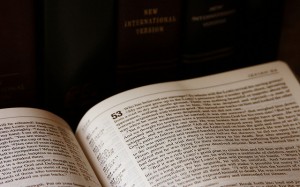The Principle of Bible Reading
By Ken Walker-
In the latest issue of Christianity Today, I compiled responses for an ongoing column titled, “Under Discussion.” The question: Should Christians read through the Bible in one year?
It’s one of those questions that, though likely to prompt plenty of discussion—even heated debate—I regret not having more space to explore. Even though I recently completed an updated, longer version for the web site, I still didn’t have room to fully review what respondents shared.
If I could characterize in one word what many of the experts I contacted had to say, it would be: “Depends.”
A Hazardous Prescription

As beneficial as Bible reading is, after a number of years, I stopped daily reading. Instead, I devote more time to meditating on various passages. In my estimation, one-year reading plans focus more on completing required reading than reflecting on it.
Indeed, to make this into an iron-clad requirement to fit the definition of a “good” believer is to court the same Pharisitical legalism that Jesus confronted.
More than once others have asked, “How many times have you read through the Bible?” The answer: I’m not sure. Nor do I consider it that as important as understanding what one reads.
Skip the Rules
I like the way Dane Ortland, senior vice president of Bible publishing at Crossway Books, put it: “No hard and fast rules should be laid down, since we all read at different paces and grow in somewhat different ways. But in general, Christians should make (it) a habit.”
Wesleyan Publishing editor Kevin Scott, author of ReCreatable, says that while Scripture teaches daily meditation on God’s Word, he is convinced it means something other than what many think of as daily reading.

“This may mean reading through the Bible in one year, or it might mean reading slower or faster than that,” Scott says. “It depends a lot on the person. There is no ‘one-size-fits-all.’”
Rachel Baruch, general manager of the popular Bible Gateway portal, points out that what matters most is spending time daily focusing your heart and mind on God’s Word. So, if a reading plan motivates you, use it.
However, she adds, “If it becomes a chore that deters you from Scripture, use a devotional, study one book in depth, or just randomly open to a chapter. Don’t judge the method.”
Developing a Plan
I have known itinerant minister Lee Grady for 20 years. For many of those we worked together (long-distance) when he was the editor of Charisma. In a recent blog, he outlined nine practical tips for making Bible study a priority in 2014.

“If you choose to read the book of Acts, for example, study one chapter a day for 28 days,” he says. “Soak up every chapter and look up words you don’t understand. Read commentaries and study notes for each chapter. After you have soaked up the meaning, you can move on to a new book of the Bible.”
A particularly relevant addendum: If you devote this kind of in-depth study to one book of the Bible each day, chances are you won’t have enough time to also read through the whole Bible this year. But I think you’ll get more out of Lee’s method.
Granted, there are people who prefer one-year reading plans. Whichever you prefer, the bottom line is—in the words of the familiar slogan: “Just do it.”


